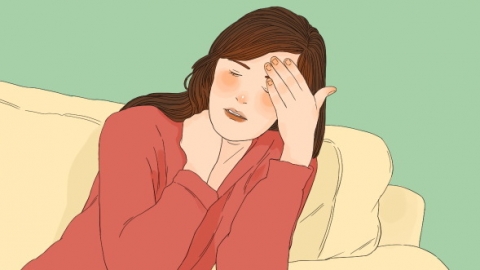What causes mental tension before going to sleep?
Generally, feeling nervous before sleep may be caused by factors such as circadian rhythm fluctuations of the nervous system, excessive pre-sleep stimulation, neurasthenia, generalized anxiety disorder, or cardiac neurosis. It is recommended to seek medical advice promptly, identify the underlying cause, and receive symptomatic treatment under a doctor's guidance. Specific analysis is as follows:

1. Circadian Rhythm Fluctuations of the Nervous System: If the sympathetic nervous system fails to be adequately inhibited before sleep and parasympathetic activation is insufficient, it can lead to feelings of tension. To promote a smooth transition in neural rhythms, turn off electronic devices one hour before bedtime and listen to calming classical music.
2. Excessive Pre-Sleep Stimulation: Watching horror movies or engaging in intense exercise before bed can keep the brain in a state of prolonged excitement, making it difficult to relax. Instead, practice meditation or simple stretching exercises before sleep, and avoid exposure to stimulating content.
3. Neurasthenia: Prolonged mental stress can make the nervous system overly excitable and easily fatigued, with heightened feelings of tension before sleep. Patients may take medications such as oryzanol tablets, vitamin B1 tablets, or diazepam tablets as prescribed, along with maintaining a regular sleep schedule.
4. Generalized Anxiety Disorder: Characterized by persistent and excessive worry, symptoms often worsen at bedtime when attention focuses on anxious thoughts. Treatment may include medications such as buspirone hydrochloride tablets, tandospirone citrate capsules, or lorazepam tablets under medical supervision, combined with cognitive behavioral therapy.
5. Cardiac Neurosis: Autonomic nervous system dysfunction can cause heart-related discomfort, leading to pre-sleep tension and palpitations. Medications such as metoprolol tartrate tablets, oryzanol tablets, or alprazolam tablets may be used as directed. In severe cases, stellate ganglion block therapy may be performed to regulate autonomic nervous function.
In daily life, keep the bedroom quiet and dimly lit, and consider using lavender aromatherapy to aid sleep. Avoid overeating and consuming spicy foods or caffeine-containing products for dinner. Drinking warm milk before bed in moderation can help improve sleep quality.




